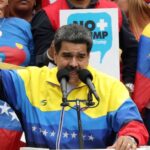ElEstado.Net published an analysis of John Bolton’s departure from the administration of President Donald Trump, asserting that him leaving will not change the approach of the US interventionist policy in Venezuela, just some details in the forms, because it responds to settled dynamics in a tenacious way inside the main institutions of the US state.
Today, without John Bolton, nor anyone who directs the National Security Council of the United States (USA), the scenario of military invasion longed for by the former councillor continues. The most radical faction of the Venezuelan right, led by Leopoldo López through Juan Guaidó, is determined that the US military enters their country as they have done in Libya and Syria.
But they are obliged to provide a justification that reviews the attack with institutional credibility and democratic appearance. They are because the press in the hands of the oligarchy, both American and Colombian, Venezuelan and Spanish among other countries, has been responsible for cleaning its image, so that its bombardments on civilians, the Guarimbas, speculations with the Prices of essential products, their links to drug trafficking, their attacks on infrastructure, or their smuggling, among many other issues, such as the sanctions applied by the United States and the European Union, which have already caused 40,000 deaths between sectors social who suffer more from poverty.
This is where the TIAR comes in. Behind its acronym is hidden an old tool that the United States created to prevent the expansion of the Union of Soviet Socialist Republics (USSR) in Latin America during the Cold War. The Inter-American Treaty of Reciprocal Assistance (TIAR), enables the US to enter militarily in one of the member countries if it is attacked by another nation. In this way, the Americans took as a fact Latin America being their territory, since they do not need any permission from the country receiving their troops so that they could do what they had to do.
Venezuela, like other countries such as Mexico, Bolivia, Nicaragua and Ecuador, withdrew from the TIAR, so it is not applicable in the nation governed by Nicolás Maduro. So why is the US interested in dedicating and spending resources on this option? Because the powerful nation of the North operates according to its own logic alien to reality.
For the United States, Juan Guaidó is the president, even though he has not received votes because he did not appear for the 2018 presidential elections. Moreover, the constitutional articles on which he was based on did not enable him to assume power legally, because the necessary constitutional condition had not occurred: the certified absence of Nicolás Maduro. And even if they would have allowed it, the deadline to call elections has already been expired for several months, so Juan Guaidó is not president even in the logic of his own arguments.
The Donald Trump Administration has not cared to act by breaking both the international and the Venezuelan national legality, so it has recognised that the National Assembly (AN), -without real powers to be in contempt because It maintains in its seats deputies who arrived making fraud-, an entity that is not recognized by either the UN or the IMF who support the decision of the Venezuelan justice to disregard the AN until its members who arrived through fraud Election are expelled, have approved the entry of Venezuela into the TIAR.
In this way, the US hopes to consolidate a story whereby the International Community considers allowing, or at least not avoiding, a military action in Venezuela that ends with the constitutional president Nicolás Maduro, since it will express that it has been the Venezuelan legislative power that has enabled that option, hiding in his powerful media apparatus, that this power is suspended by the electoral fraud committed by the opposition, so that his actions are not valid.
The current scenario is not favourable to the United States if it wants to use the TIAR to attack Venezuela militarily. It is possible that it can tighten the blockade that it holds against Venezuelan citizens, because the TIAR makes it easier for Donald Trump’s allies to break diplomatic relations, implement naval and air blockades in addition to the use of the armed force, but it will be difficult to apply this last option because opposition to it is growing, even among the main US allies, such as Chile and Peru, who have said they will not support a military operation even if it is based on the TIAR.
This article was translated by Stefany Karla Paez Morillo of @NHorizontes_UK.



